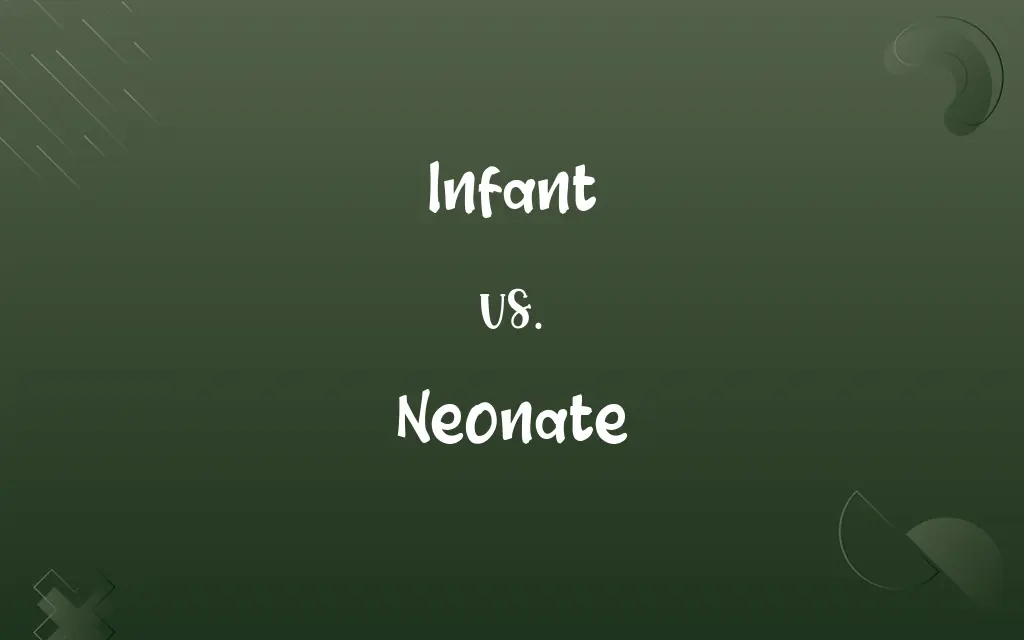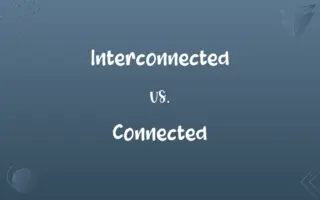Infant vs. Neonate: Know the Difference

By Shumaila Saeed || Updated on December 25, 2023
An infant refers to a young child, especially under one year old, while a neonate specifically denotes a newborn, especially in the first four weeks of life.

Key Differences
Infant is a term used to describe a young child, generally under the age of one year. It encompasses a broader age range from birth to the first birthday. Neonate, on the other hand, is a more specific term used in medical and healthcare contexts, referring to a newborn baby, particularly in the first four weeks after birth.
Shumaila Saeed
Nov 11, 2023
In terms of development, an infant goes through several stages, including physical growth, cognitive development, and the beginning of speech and language skills. A neonate is in the earliest stage of life, where the primary concerns are basic physiological functions like feeding, sleeping, and adjusting to the external environment.
Shumaila Saeed
Nov 11, 2023
When discussing healthcare, infants require regular pediatric check-ups, vaccinations, and monitoring of developmental milestones. In contrast, care for a neonate often focuses on immediate postnatal care, monitoring for any birth-related complications, and ensuring a healthy transition from the womb to the external world.
Shumaila Saeed
Nov 11, 2023
Parental care and societal views on infants often encompass nurturing, early education, and socialization. For neonates, the focus is more on immediate post-birth care, bonding with parents, and adapting to the sensory stimuli of the outside world.
Shumaila Saeed
Nov 11, 2023
Legal and social services categorize infants as children under one year, addressing a wide range of needs from childcare to parental leave policies. Neonates, in legal and medical documentation, are specifically referred to in contexts like neonatal care units, birth records, and early life medical interventions.
Shumaila Saeed
Nov 11, 2023
ADVERTISEMENT
Comparison Chart
Developmental Stage
Physical, cognitive, and language growth
Basic physiological adjustment and growth
Shumaila Saeed
Nov 11, 2023
Healthcare Focus
Regular check-ups, vaccinations
Immediate postnatal care, monitoring for complications
Shumaila Saeed
Nov 11, 2023
Context of Use
General, including legal and social services
Specific to medical and healthcare contexts
Shumaila Saeed
Nov 11, 2023
ADVERTISEMENT
Infant and Neonate Definitions
ADVERTISEMENT
Neonate
Immediate Postnatal Stage
The neonate's health is closely monitored.
Shumaila Saeed
Nov 11, 2023
Infant
A child in the earliest period of life, especially before being able to walk.
Shumaila Saeed
Oct 19, 2023
Infant
A very young human being, from conception to somewhere between six months and two years of age after birth, needing almost constant care and attention.
Shumaila Saeed
Oct 19, 2023
Infant
(obsolete) To bear or bring forth (a child); to produce, in general.
Shumaila Saeed
Oct 19, 2023
Infant
A child in the first period of life, beginning at his birth; a young babe; sometimes, a child several years of age.
And tender cries of infants pierce the ear.
Shumaila Saeed
Oct 19, 2023
Infant
A person who is not of full age, or who has not attained the age of legal capacity; a person under the age of twenty-one years; a minor.
Shumaila Saeed
Oct 19, 2023
Infant
Of or pertaining to infancy, or the first period of life; tender; not mature; as, infant strength.
Shumaila Saeed
Oct 19, 2023
Infant
To bear or bring forth, as a child; hence, to produce, in general.
This worthy motto, "No bishop, no king," is . . . infanted out of the same fears.
Shumaila Saeed
Oct 19, 2023
Infant
A very young child (birth to 1 year) who has not yet begun to walk or talk;
Isn't she too young to have a baby?
Shumaila Saeed
Oct 19, 2023
Repeatedly Asked Queries
Can infants walk?
Some infants start walking closer to their first birthday.
Shumaila Saeed
Nov 11, 2023
Are all newborns neonates?
Yes, all newborns are considered neonates for the first four weeks.
Shumaila Saeed
Nov 11, 2023
What kind of care do neonates need?
Neonates need round-the-clock care, including feeding and temperature regulation.
Shumaila Saeed
Nov 11, 2023
Is a two-month-old baby still a neonate?
No, after four weeks, they are considered infants.
Shumaila Saeed
Nov 11, 2023
Are infant and baby interchangeable terms?
Generally, yes, but "infant" is more specific to age.
Shumaila Saeed
Nov 11, 2023
Can infants recognize their parents?
Yes, infants often start recognizing parents within a few months.
Shumaila Saeed
Nov 11, 2023
What is neonatal care?
It's specialized care for newborns, particularly in the first weeks.
Shumaila Saeed
Nov 11, 2023
Do neonates have sleep schedules?
Neonates often sleep a lot but without a set schedule.
Shumaila Saeed
Nov 11, 2023
What vaccinations do neonates receive?
Some vaccinations, like Hepatitis B, may be given shortly after birth.
Shumaila Saeed
Nov 11, 2023
What are common milestones for infants?
Smiling, cooing, sitting up, and sometimes crawling.
Shumaila Saeed
Nov 11, 2023
Why is neonatal nutrition important?
It's crucial for growth and development in the early stages.
Shumaila Saeed
Nov 11, 2023
How are premature neonates cared for?
They often require special care in a neonatal intensive care unit (NICU).
Shumaila Saeed
Nov 11, 2023
What is the main focus for neonates in hospitals?
Ensuring their healthy transition and addressing any immediate health issues.
Shumaila Saeed
Nov 11, 2023
Can infants form bonds with caregivers?
Yes, bonding starts early in infancy.
Shumaila Saeed
Nov 11, 2023
Do infants need regular doctor check-ups?
Yes, to monitor growth and development.
Shumaila Saeed
Nov 11, 2023
Do infants recognize voices?
Yes, they can recognize familiar voices over time.
Shumaila Saeed
Nov 11, 2023
Share this page
Link for your blog / website
HTML
Link to share via messenger
About Author
Written by
Shumaila SaeedShumaila Saeed, an expert content creator with 6 years of experience, specializes in distilling complex topics into easily digestible comparisons, shining a light on the nuances that both inform and educate readers with clarity and accuracy.








































































